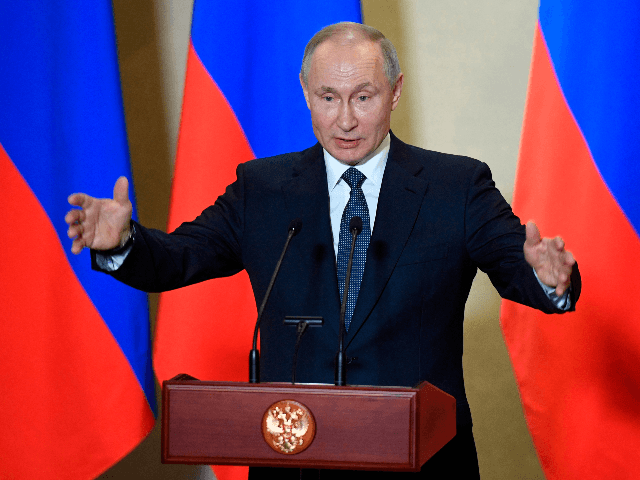Russian leader Vladimir Putin told his Tajik counterpart, Emomali Rahmon, on Tuesday that Russia would offer his country “necessary support” in the face of a growing threat of Taliban attacks on the nation’s border with Afghanistan.
Tajikistan borders Afghanistan to the latter’s north, where Taliban terrorists have engaged in largely successful seizures of dozens of districts out of the hands of the legitimate Afghan government. Taliban spokesmen have insisted many of these seizures were largely peaceful as members of Afghan security forces have either joined the Taliban or fled the battlefield. The Tajik government confirmed Monday that it had documented over 1,000 Afghan troops fleeing across the border, seeking protection from Taliban attacks.
The Taliban campaign began in April after American President Joe Biden announced that he would break a deal brokered by his predecessor, Donald Trump, with the government of Afghanistan and the Taliban that would result in a full withdrawal of American troops from the country. The original agreement would have resulted in America’s military withdrawal concluding by May 1, 2021, in exchange for the Taliban agreeing not to attack American forces and cutting ties with international terrorist groups like al-Qaeda. Biden extended the war for another four months, vowing a full military withdrawal by September 11, 2021, and insisted the United States would remain deeply involved in Afghan politics in a civilian capacity after that.
Taliban leaders decried Biden’s move as a violation of the Trump-era agreement and asserted they were no longer beholden to any of the limits that deal imposed on the jihadist group.
The Kremlin published a short readout of Putin’s conversation with Rahmon that stated only that Russia was willing to “support” Tajikistan.
“The discussion focused on the difficult situation on the Tajik-Afghan border caused by the escalation of armed confrontation in Afghanistan, including in the border area,” the readout relayed. “Vladimir Putin confirmed his readiness to provide Tajikistan with the necessary support, both bilaterally and within the framework of the Collective Security Treaty Organisation.” The CSTO is a military alliance of former Soviet states, of which Tajikistan is one, that greatly expands Russia’s military purview over Central Asia.
Putin reportedly expressed similar support in a call to the president of neighboring Uzbekistan. According to Afghanistan’s Khaama Press, the Uzbek government is particularly concerned about a potential surge in Afghan refugees fleeing across the Uzbek border as the Taliban continues to gain ground.
Russian Deputy Foreign Minister Andrei Rudenko clarified Tuesday following the publication of the phone call readouts that the support Moscow was offering its Central Asian neighbors was of a military nature and specifically in response to the fact that the Taliban is securing gains all along the Tajik border.
“Everything will depend on how the situation unfolds in northern Afghanistan. As far as we understand, the tensions are quite high because, according to some reports, the Taliban controls 70% of the border,” Rudenko said. “As you know, we have the 201st Military Base in Tajikistan, which is fully equipped to provide assistance to the country if the need arises.”
“If the situation requires additional efforts, they will be undertaken,” Rudenko promised, according to the Russian news agency Tass.
Dmitry Peskov, the Kremlin’s official spokesman, similarly said Tuesday that Russia would “make appropriate decisions” regarding troop deployment in and around Afghanistan after monitoring the situation there. He did not directly answer if Russia would soon deploy troops to Tajikistan.
Tajikistan itself mobilized 20,000 troops to conduct border security this week. According to Radio Free Europe/Radio Liberty (RFE/RL), the Taliban now controls 26 of 28 districts in Badakhshan province, which borders Tajikistan. The province’s regional capital Faizabad is reportedly the last bastion standing against Taliban control. Reports from multiple Afghan sources coincide with Taliban assertions that the jihadists took most of the province without a fight.
Taliban spokesman Zabihullah Mujahid asserted Monday, sharing photos allegedly from the region on Twitter, that the Taliban received a warm welcome from local civilians and that fleeing soldiers left abundant “heavy weapons” for the terrorist organization to use.
“The enemy fled to neighboring Tajikistan for fear of Mojahedin [Taliban] attacks across the border. Weapons, tools, and equipment were seized by the Mojahedin,” Mujahid claimed.
The Afghan government in Kabul vowed Monday to retake the conquered territories, even in the face of losing hundreds of fleeing soldiers.
“We will recapture the district centers’ buildings, the people are our strong supporter in this; you witnessed in some districts that the people came out along with their weapons,” National Security Adviser Hamdullah Mohib asserted, according to Afghanistan’s Tolo News. Mohib appeared to be referencing Kabul’s growing dependence on vigilante militias, rather than the official Afghan Security Forces, to fight the Taliban on its behalf. Reports began surfacing last month that Kabul officials had begun turning to tribal militias for support in its efforts to contain the Taliban, particularly those made up of ethnic groups, like the Hazara, who have endured Taliban persecution. Recruitment efforts appear to be moderately successful, though battleground victories remain elusive.

COMMENTS
Please let us know if you're having issues with commenting.